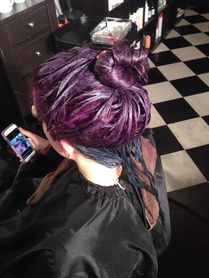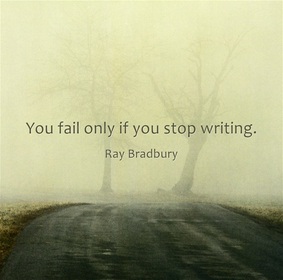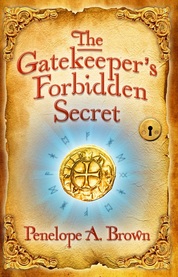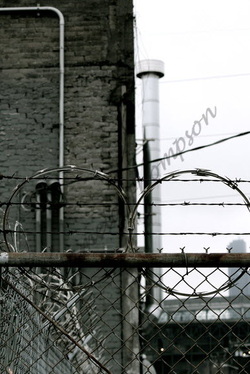|
by Camela Thompson The need for authors to establish a platform through social media is the source of much whining. I understand it. I lived it. I remember sitting in a seminar at a local writer's conference near tears because the jargon being spewed by the presenter was foreign and overwhelming in volume. She kept repeating the phrase, "You need to do this." Why was she repeating herself? Because she knew that most of us sitting in the crowd wanted nothing to do with it. We still wanted to believe that an agent would figure it all out for us. We'd hand in our manuscripts and be able to focus on the next book. Now I can laugh as I type that last sentence out. The presenter was right. Social Media is important. The reasons to avoid Social Media are numerous and often illogical. Let's look at a few of the most popular arguments: We're introverts! We don't like talking to people! Social media is the perfect way for introverts to market their book. I count myself in the introvert crowd. Conversations in person never go as I imagine them - and I imagine them again once they're done and I come up with the perfect comeback. If someone is staring me down, wit goes out the window. Somehow when my smart phone or laptop is between me and the people I'm interacting with, things get better. That and I can claim I didn't see the alert while I think of a better response. Social Media gives us the perfect opportunity to use our craft to interact with the world. It's writing! I don't have time! Puh-leaze. If you have a smart phone, you have time. Waiting for your car to be repaired? Add pins to your storyboard on Pinterest. Getting your hair cut or dyed? Participate in a Twitter chat. Standing in a ginormous Starbucks line? Tweet about it. Impossible, you say? I have literally done all of these things. Here's a picture I posted during a recent Twitter chat - and it was a fantastic springboard for a conversation with other authors: Photo taken by Hair by Summer in Seattle - she's awesome! Any time you are bored enough to get out your phone and stare at it, remind yourself to tweet, post, or pin. Especially during elevator rides and your commute on public transit if only for the material that inevitably will slide your way. Hopefully not literally. Some of those bus rides are scary.
I don't want to take time away from my writing. Sorry, this isn't valid for a few reasons. If you have a smart phone, you can be setting up your social media posts when it's not possible to write (like in line at Starbucks, waiting for your car to be fixed, getting your hair done, etc.). Even those of you who write full time cannot possibly sustain a continuous day of writing without breaks. During one of those breaks, open up Hootsuite and schedule some posts ahead of time. If you have writer's block, find pretty pictures and quotes that speak to you instead of using original content. If you have time to sit on your couch to watch television or a movie, you have time to schedule social media posts. I know, sometimes you need to have a break from anything author related. Take those breaks, but remember that thirty minutes are all it takes to schedule several posts for the week. The final reason: short posts will not leech your creativity. Why are you really avoiding Social Media? The arguments I've listed are the most common, but I don't think they are the root of the problem. I believe that the real hesitation to embrace social media is fear. Fear impacts us even when we don't acknowledge it. Some of us fear technology. This is fair, but it's something that can be overcome. I believe the real hesitation for most of us is the risk that comes with putting ourselves out there. So many questions popped into my head when I first started. How much should I share? What will I talk about? Why would anyone want to read what I have to say? Beyond my fear of insignificance was a fear of being ridiculed. Social Media is a powerful tool, and even the most well known writer can boost sales. They can destroy them too, which is a sobering thought. As we learned growing up, it's easy to say the wrong thing and be taken out of context. That doesn't mean we stopped talking. We adjusted. Apply those same lessons online. If you wouldn't say it in the office, leave it offline or accept the risk that you will start a fire. Tips to Make Things Easier Start with What You Know Do you have a personal Facebook account? Start there. You already know how to use the user interface, now it's up to you to come up with content. Not sure where to start? Follow your favorite authors and watch them for a week or two. See what generates the most comments for them and what appeals to you. Remember that established writers can break the rules. If you are just starting out and write general fiction, spouting off about politics and religion will alienate some of your potential readers. You are allowed to have your opinion, but if someone doesn't agree with you, they might not buy your book because of a topic that has absolutely nothing to do with your writing. Is it worth it? Once you're comfortable with one Social Media platform, considering adding another. Just one! Do not join them all at once. It's the quickest way to burn out. Put Pages Under Your Name Do not create pages for your book unless that is the only book you ever plan to write. You are a brand. Eventually people will look for what you write by your name. If it's under your name, you do not have to start over every time you publish. Establish Boundaries What do you want to open the door to? I've seen posts about arguments with spouses, political beliefs, and disagreements with family members. I've read touching essays about loss and grief. I've seen people bare their souls when discussing past abuse and health problems. What you discuss is between you, the people in your stories, and the world. What you put online is forever and can never be taken back. This doesn't mean you shouldn't write what is hard. Just remember that coworkers will find your work as well as family members. If that makes you uncomfortable, maybe you shouldn't hit "Publish." Proofread If you can find someone to read your post before you publish it, excellent. If not, read it out loud before publishing. Often I find that I catch more mistakes if I say the words out loud. It forces me to read each word instead of skipping over them. Scheduling posts ahead of time really helps! It gives you an opportunity to review your posts more than once before publishing. Kindness What you put out in the world comes back to you. I truly believe it. This is a small community, even more so because of Social Media. Don't badmouth others and for God's sake, DO NOT FEED THE TROLLS. Do you love or hate Social Media? Are there other tips and tools you would suggest?
4 Comments
by Camela Thompson
The last time I went to a book club meeting to speak about All the Pretty Bones I mentioned my day job. The reaction was flattering. People thought I would be writing full time with a novel out the door. The sad reality is that the medium income of novelists was estimated at $5,000 per year with over a third of published authors under $500 per year. I joke that my royalty checks are my means to support my book habit, but I'm not even there yet. Notice I said "yet." I'm not sure if it's optimism or my stubborn streak, but I'm determined to keep working at it. I also intend to keep working full time to maintain our standard of living until I make it as an author. Finding Time to Write Last weekend I attended the Write Here Write Now conference held by the Seattle 7 Writers. If you are in the Seattle area, I highly recommend it. The conference is great for several reasons, but I especially appreciate the opportunity to hear published authors offer advice. At one point, the question was, "How do you find time to write?" Dave Boling explained that if writing was an essential part of your being, you make time. Even if it means writing on a flight, during the commute to work, or after the kids go to bed - writers find a way. One of the authors speaking the prior year was a physician with young twins and she still produced multiple novels per year. I have explained that I need to write. It calms me. My husband seems to understand this and lets me retreat into my alternate world for hours at a time. However, it's not always possible for me to sit down after a full day of work and write more words. On those days, I focus on lining up my social media material for the week. There are also stretches of time when my need to write leaves me. A weekly writing group helps me commit to at least two hours of writing per week. An Average Weekday I work for a large corporation as a CRM administrator and analyst. The day is divided between meetings, redesigning process flows, and writing code. It's challenging, but rewarding. If I do my job well, I make it easier for other people in the company to do their own job. I'm lucky - I can squeeze in some social media work between tasks. When I first get in, I find quotes and images, then schedule posts for Facebook and Twitter. After a full day of work, I feed the dog, walk the dog, and start on dinner. I spend an hour on social media, then I write until it's time for bed. I average an hour to an hour and a half of writing per weekday. Support Structure I work a lot. It's easy to burn out. My husband is really good about taking on extra house work. Our house would be a disaster if he didn't. There are days I start writing and the rest of the world drops away. I forget to eat, and he steps in without complaint or asking. A wife absorbed in her writing isn't fun, but he knows that I'm working hard. I hope that I'll be able to spend my day writing and have more normal evenings eventually, but it's working for now. My writing group and critique groups are awesome. Sometimes the biggest help is the opportunity to share writerly woes and commiserate. Writing is a solitary activity until the first or second draft is done. It's up to me to sit my butt in a chair and write until the book is finished. I have to figure out how to stay motivated and not buckle when I inevitably begin to question my work. Finding the time and drive to keep going is up to me, but a little bit of help from others goes a really long way.  What do you do when your dreams turn into epic stories about advanced civilizations? Penelope A. Brown moved away from the business world to turn those dreams into her debut novel. Penelope is the author of The Gatekeeper's Forbidden Secret and I feel very fortunate to have the opportunity to interview her. Please tell us about yourself. I was originally born and raised in England in a magical little village, which has been the inspiration for my writing. After moving to America with my family, I attended college and graduated with a Bachelors Degree in Business. I worked as a Financial Advisor and later a Business Strategist, before heading an internet company. I longed to write and my passion took hold of me in 2012, when I abandoned all other projects to focus full-time on writing. Tell us about The Gatekeeper’s Forbidden Secret. The Gatekeeper’s Forbidden Secret is part scientific thriller and part epic adventure. Some unlikely souls stumble upon forbidden truths and are faced with difficult life-changing decisions, all while keeping the ultimate secret. What inspired your story? I used to have vivid dreams about fantasy landscapes and advanced civilizations. I would always keep journals until I finally put my overactive imagination to work in the form of a novel. I read that you grew up in England. I remember being stunned by the architecture and stories that sprung up at every location. Do you feel having experience living in multiple countries adds to your stories? Yes, the backdrop of England is essential to the mystery and magic that is tangled throughout the fibers of my novel. What is the last book you read that left a lasting impression and why? The last book I read was Inferno by Dan Brown. Dan Brown incorporates actual history into every work. Some may criticize his technique claiming that it slows the story down, but personally, I enjoying learning new things. What is the hardest part of being an author? I am an introvert, like most authors, so the hardest part of being an author is marketing your book. Also, once people find out what you do, want a thirty second commercial about you. I tend to freeze up in these situations. My sister, who is also an author, suggests groups such as Toastmasters to get over your nerves and always be ready for the spotlight. Are there any television shows you are hooked on? My guilty pleasure is Days of Our Lives. Most of the story lines are ridiculous, but the constant conflicts and love triangles lead for interesting television. Do you have any habits or rituals that help you write? Great question, no one has ever asked me that, but yes I do. I always mediate for a few minutes before I write. It helps to clear my mind. I also play suspenseful music when I write. Don’t tell anyone. If you could take your family on a vacation anywhere in the world, where would you go? One day we will all be going to Venice, Italy! It is definitely on my bucket list. I can see us all in a gondola rowing down the picturesque Grand Canal. More on The Gatekeeper's Forbidden Secret
by Camela Thompson Have you ever had a rush of chills shoot down your spine for no good reason? It happens to me from time to time. I've walked down a trail in the forest and cold fingers crept up my back. I stopped and paced backwards, trying to figure out what had unnerved me. A foul smell hovered across the path, growing stronger towards a thicket. Maybe I had just missed a Sasquatch (<-- sarcasm). A cold patch rested upon my neck in the middle of an intersection. Obviously I didn't stop walking. That would be foolish in the middle of a city. I've been alone in my house and felt a hand rest on my back. I don't feel I'm sensitive or that the source of my anxiety is paranormal. Humans are masterful at invention, improving their environment through manufactured means. Cushioned from nature - and even other humans thanks to technology - we have forgotten about the instincts we've relied on since our beginnings. All day we are faced with other humans, subconsciously reading their facial expressions and body language. We are social animals with instincts, and the ability to interpret potential threats translates into adrenalin production before our brains can rationalize the response. However, the reaction can be spontaneous, and it's easy to wonder if something more sinister is responsible. Maybe it's a shiver from the past - the imprint of something terrible left behind. We laugh, or tell ourselves that we're being silly and move on to something more responsible like remembering to pay a bill or how to market an upcoming novel. Those memories fade and eventually disappear. Or do they?
Not for me. They haunt me, popping up in my writing at unexpected times. The place I watched a homeless man beat himself senseless worked its way into chapter eight, serving as the backdrop for Lucian's place of business. It was a place I walked frequently on the way to work and never grew comfortable with. It was too stark. Pavement, brick, and cold grays covered everything. When I needed a place to house an arms dealer's place of business the reinforced doors, barred windows, razor wire, and security cameras provided the perfect backdrop. The area is industrial with a smattering of bars. There was even a strip club to leverage. How could I resist? It seems as though those creepy moments experienced firsthand add a realistic air to those scenes. How can an artist paint a scene they have never witnessed? Our imaginations can take the scenario to a new level, but that underlying emotion can provide a solid foundation. Maybe if I let myself dwell a little longer when those moments hit, I could create even more realistic scenes. On the other hand, it's probably best to listen to what my instinct is telling me and keep walking. Have you had an unsettling feeling about a location that fed into your work or heightened your response to someone else's writing? |
Camela ThompsonFreelance writer and Dark urban fantasy author featuring vampires with bite. My BooksCategories
All
Archives
July 2020
|




 RSS Feed
RSS Feed